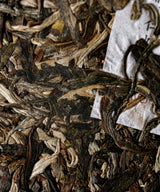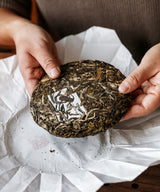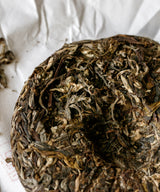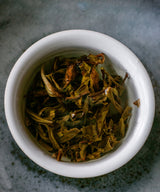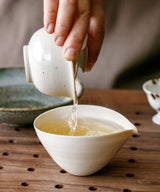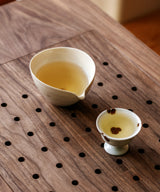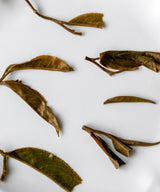Ancient Big White
古乔大白普洱
Harvest
April 2024
Origin
Jinggu, Yunnan
Ancient pu’erh tea trees are not uncommon in Yunnan, however we rarely come across any of the Jinggu Dabai, or “Big White,” varietal outside of Yangta Village. This rare varietal is native to Yangta and the trees have never spread far from where they originated.
On account of its rarity, the price of fresh leaves from the ancient Jinggu Dabai tea trees increases each year. Despite their climbing market value, Mr. Tang insists on making a very small amount of pu’erh from Jinggu Dabai every year, should he be so lucky as to find fresh leaves on the ancient trees.
This rare and unusual pu’erh Mr. Tang makes comes from a grove of 300 ancient Jinggu Big White tea trees near his property. The trees here are approximately 400 years old; they stand together in the only known grove of the ancient Big White varietal to exist. Their newly sprouted leaves are golden yellow, and their branches, covered in moss and lichen, are full of vitality.
The Jinggu Dabai varietal is subdivided into 9 varieties – the yellow buds are used to make the Ancient Gold Needle that Cultivate also carries, and the other 8 varieties are used together in crafting this Ancient Big White. The trees stand in the same grove of ancient tea trees that are over 400 years old and, just as the Ancient Gold Needle, this pu’erh is “pure material,” meaning there hasn't been any mixing with leaves from younger tea trees.
The effect that this tea has is unusual: it tastes delicate and refreshing, while simultaneously having a deep energetic effect. The texture of this tea hints at it being more substantial than we would guess from its flavour, and we pick up on its affect during the aftertaste.
We would want this pu’erh on an intentional day. It asks for patience, and seems to slow us down into a contemplative and open-minded state. After several infusions of this tea we find our thoughts moving in less familiar ways; something worth watching for. The soft gold liquor is viscous and heavy; it passes across the mouth quickly, carrying with it a bright, beguiling taste reminiscent of lemon-yogurt. The activity of this sweet and complex ferment settles very deeply in us, and offers the strong energy that accompanies such abiding trees.
. . .
Brewing guide
| Tea | 4 g |
| Temperature |
100°C |
| Water | 120 ml |
| Steep time | 10 - 60 sec |
| No. of infusions | 10+ |

